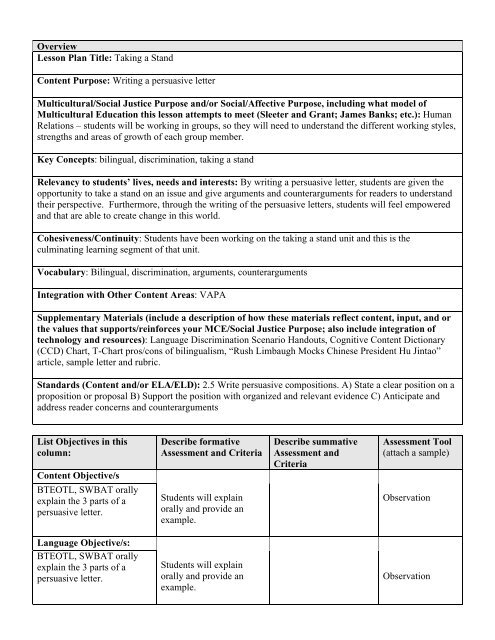Example 1
Example 1
Example 1
Create successful ePaper yourself
Turn your PDF publications into a flip-book with our unique Google optimized e-Paper software.
Overview<br />
Lesson Plan Title: Taking a Stand<br />
Content Purpose: Writing a persuasive letter<br />
Multicultural/Social Justice Purpose and/or Social/Affective Purpose, including what model of<br />
Multicultural Education this lesson attempts to meet (Sleeter and Grant; James Banks; etc.): Human<br />
Relations – students will be working in groups, so they will need to understand the different working styles,<br />
strengths and areas of growth of each group member.<br />
Key Concepts: bilingual, discrimination, taking a stand<br />
Relevancy to students’ lives, needs and interests: By writing a persuasive letter, students are given the<br />
opportunity to take a stand on an issue and give arguments and counterarguments for readers to understand<br />
their perspective. Furthermore, through the writing of the persuasive letters, students will feel empowered<br />
and that are able to create change in this world.<br />
Cohesiveness/Continuity: Students have been working on the taking a stand unit and this is the<br />
culminating learning segment of that unit.<br />
Vocabulary: Bilingual, discrimination, arguments, counterarguments<br />
Integration with Other Content Areas: VAPA<br />
Supplementary Materials (include a description of how these materials reflect content, input, and or<br />
the values that supports/reinforces your MCE/Social Justice Purpose; also include integration of<br />
technology and resources): Language Discrimination Scenario Handouts, Cognitive Content Dictionary<br />
(CCD) Chart, T-Chart pros/cons of bilingualism, “Rush Limbaugh Mocks Chinese President Hu Jintao”<br />
article, sample letter and rubric.<br />
Standards (Content and/or ELA/ELD): 2.5 Write persuasive compositions. A) State a clear position on a<br />
proposition or proposal B) Support the position with organized and relevant evidence C) Anticipate and<br />
address reader concerns and counterarguments<br />
List Objectives in this<br />
column:<br />
Content Objective/s<br />
BTEOTL, SWBAT orally<br />
explain the 3 parts of a<br />
persuasive letter.<br />
Describe formative<br />
Assessment and Criteria<br />
Students will explain<br />
orally and provide an<br />
example.<br />
Describe summative<br />
Assessment and<br />
Criteria<br />
Assessment Tool<br />
(attach a sample)<br />
Observation<br />
Language Objective/s:<br />
BTEOTL, SWBAT orally<br />
explain the 3 parts of a<br />
persuasive letter.<br />
Students will explain<br />
orally and provide an<br />
example.<br />
Observation
















